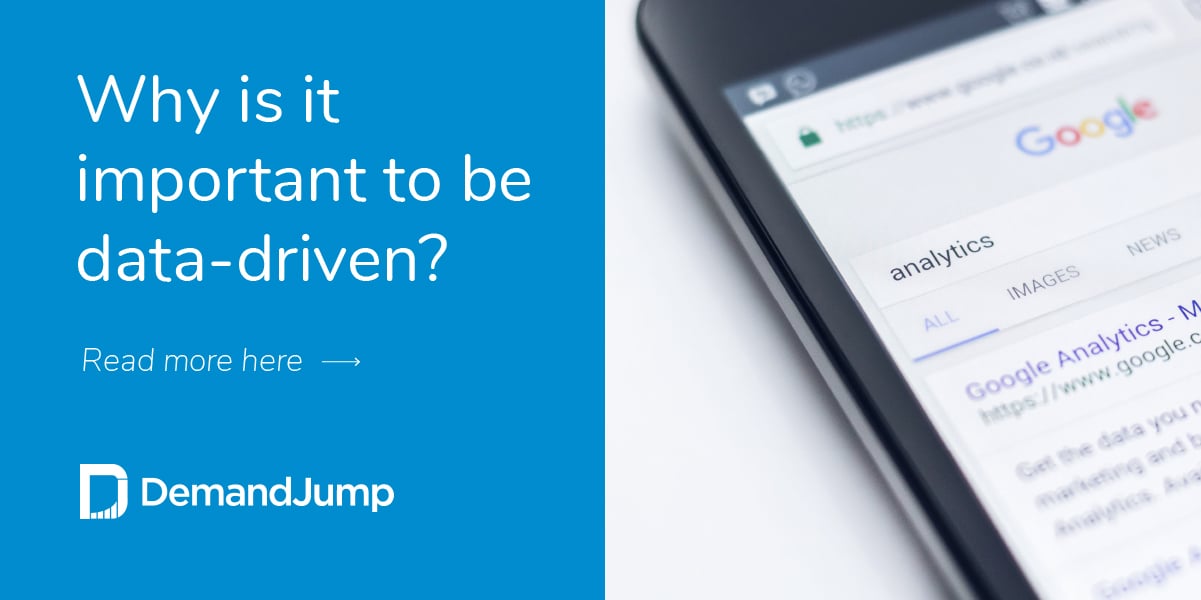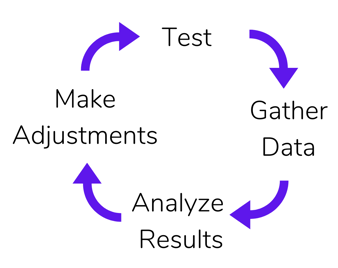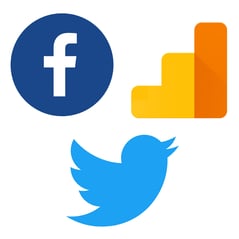Why Is it Important to be Data-driven?
March 23, 2020 •DJ Team

Everywhere you turn, there are data points being captured and leveraged by organizations to improve your customer experience -- whether you are conscious of the activity or not. Google captures where you are located and tags any photos you take with their correct geolocation.
Facebook is continually looking for ways to serve more relevant advertising, and they do that by tracking your activity online and in real-life interactions with the brands that you follow. Online businesses continually track your purchases, offering upsell and cross-sell opportunities at every turn.
Each time you visit a website, see an advertisement on your streaming television service, sign up for text messages for a brand or even open an email you are telling various organizations a tiny bit about your world that is then captured in minute detail to support a data driven marketing strategy.
Click here to see how data-driven your marketing strategy actually is.

Being Data-Driven
What does it truly mean to be a "data-driven" business? It's not enough that you are simply capturing information in a variety of different platforms. Until you are able to pull together consumer and transaction details and leverage that information to make decisions, your company may not qualify to be considered truly data-driven.
Business leaders have been praised for their intuition for generations, but the next generation of leaders will be the ones that no longer have to rely on gut instinct. Instead, they will be able to fully validate their recommendations with a wide range of data points from across the organization. Capturing and storing the information in a secure and cohesive fashion is difficult enough -- taking the next step to analyze the data requires a commitment to the importance of the data that's available within your organization.
Benefits of Being a Data-Driven Business
Have you ever guessed at the answer to a question, and later learned that you were wildly inaccurate in your estimates? With access to the right data and data analytics techniques, you are no longer left to guess about outcomes -- you can quantify various scenarios and make a much more educated decision to move your organization forward.
Data-driven decision making has a foundation in capturing and analyzing specific data points that are defined by meaningful KPIs. Simply capturing terabytes of data that is never accessed, used or organized doesn't add value for your company -- it's the final step of the data analysis where the value comes into play. Only a few years ago it was too difficult for business and marketing professionals to learn everything needed to be successful at data driven marketing without a team of data scientists at the ready. Now, business intelligence software has evolved to make it easier for individuals to extract insight from the sheer quantity of data that's being captured.
Data-Driven Decision Making
So far, this is all theory -- how do you put data driven decision making into practice in the marketing world? Here's a simple example: You are running four different Facebook ads at the same time, and want to see which one is the most successful.
- Your first step is to define "success" for this campaign. Does that mean views of your message? Clicks through to your website? Purchases of a specific product?
- Define how you can capture the details that you need, across various platforms including Facebook Business Account, Google Analytics and your internal purchasing systems.
- Create a plan to identify the most effective ad at driving your specific results.
You might have one ad that has an extremely low cost per impression, which initially may make it the most attractive. Before you dump all of the other ads to focus on the low-cost leader, consider the actual cost per conversion or purchase. You might easily find that the ad with the highest cost per impression is actually much more efficient at driving the business outcomes that you need. This decision was driven not by a surface glimpse at the metrics, but a deeper dive and analysis of the results.
How Do I Become More Data-Driven?
Becoming a more data driven organization often requires a retooling of internal processes or the addition of new data analytics techniques in your marketing toolkit.

Google Analytics, Facebook Business Accounts, Hootsuite or other social aggregators, Twitter, internal systems -- attempting to pull these various data sets together can become a confusing mesh of information that becomes overwhelming for business users. When you work with software that analyzes data across channels, one that is developed specifically to allow marketers and business users to make better data driven decisions, you are taking the first step towards becoming a more data driven organization.
Whether you are looking for your first analytics tools or already understand the importance of data driven marketing, DemandJump can help quantify the outcomes for your marketing inputs - providing an added layer of confidence that you are making the right decisions for your organization. Learn more today or schedule your free demo to gain a more holistic view of your business that incorporates consumer information, competitor insight, and cross-channel marketing data.
Featured Articles
Categories
- Attribution Tracking (13)
- Channel Optimization (11)
- Consumer Insights (68)
- Content Marketing (251)
- Data Science (8)
- Digital Marketing (6)
- Digital Transformation (26)
- Enterprise (10)
- Lead Generation (14)
- Market Intelligence (8)
- Marketing Analytics (39)
- Marketing Attribution (57)
- Marketing Management (153)
- Marketing Operations (86)
- Organic Search (222)
- Paid Search (52)
- Pillar-Based Marketing (63)
- Programmatic Advertising (9)
- SaaS Content (14)
- SaaS Marketing (29)
- Search Marketing (111)
- SEO Keyword Research (28)
- SEO Pillar (18)
- SEO Strategy (46)
- SMB (5)
- Website Content (12)


